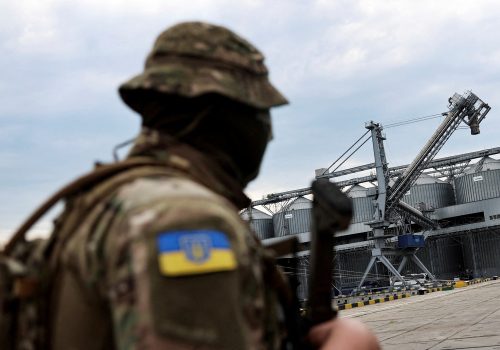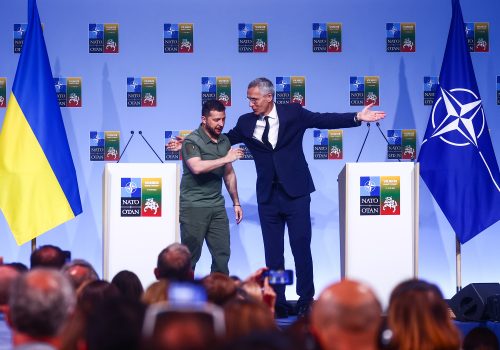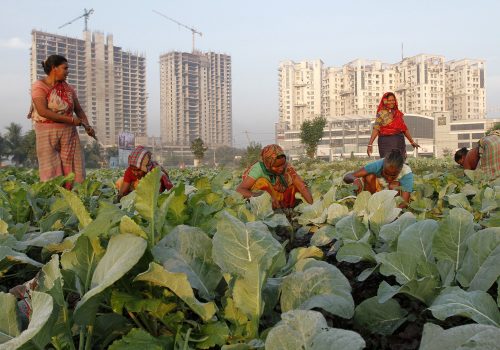Russia just quit a grain deal critical to global food supply. What happens now?
That ship has sailed. Just after 8:00 a.m. local time on Sunday, the bulk carrier TQ Samsun pulled out of the Ukrainian port of Odesa en route to Istanbul. It was the last vessel to leave under the United Nations (UN) and Turkey-brokered deal to export grain and fertilizer by sea from Ukraine amid Russia’s full-scale invasion. On Monday, the Kremlin announced that it would halt the deal, curtailing vital Ukrainian food exports that fed four hundred million people worldwide before 2022, according to the World Food Programme.
Below, Atlantic Council experts answer four pressing questions about what just happened and what to expect next.
1. Why did Russia pull out of the deal?
Moscow’s notification to the UN, Kyiv, and Ankara that it was suspending participation in the grain deal and would not renew the deal further is part of a negotiating strategy to loosen sanctions and gain more freedom of maneuver. Russian standard practice is to make humanitarian measures conditional upon concessions that serve its military, economic, and political interests—as it has with earlier negotiations on the grain deal and numerous times over relief and aid deliveries in Syria.
Specific demands in this case include readmitting the Russian agricultural lender Rosselkhozbank back into the Society for Worldwide Interbank Financial Telecommunication (SWIFT) mechanism, allowing Russia to import repair parts for agricultural machinery, and unfreezing other assets. Moscow claims that the deal, known as the Black Sea Grain Initiative, has not delivered on points that were to benefit Russia, but this round of pressure is certainly about more than the letter of the deal; it is about easing sanctions pressure.
—Rich Outzen is a nonresident senior fellow at the Atlantic Council IN TURKEY and a geopolitical analyst and consultant currently serving private sector clients as Dragoman LLC.
2. What’s the next move for Ukraine and its Western partners?
In October 2022, Russia left the grain deal, actually suspended its participation, and there were only three parties left: the UN, Turkey, and Ukraine. The grain corridors at that time functioned well, in part because the Russian inspectors had been disrupting the grain deals from inside. The most rational way to react to this withdrawal is to proceed in the trilateral format with the UN, Ukraine, and Turkey. I don’t think Russia has a lot of options now. In the northwestern part of the Black Sea, Russia lacks capacity to inflict any major damage. Since Ukrainian armed forces retook Snake Island last year, the maritime area has been largely controlled by the Ukrainian side. So there is little possibility for a major disruption by Russian vessels in this part of the Black Sea.
Russia could say that continuing the deal in a trilateral format crosses a “red line.” But if Russian forces attack a vessel transporting grain, it could trigger a major reaction that Moscow would not want to face, depending on which country the vessel belongs to, who is the owner, and who the sailors are. I would not be surprised if after a meeting or phone conversation with Turkish President Recep Tayyip Erdoğan in the next few weeks, Russia rejoins the grain deal.
Meanwhile, messages from Ukrainian President Volodymyr Zelenskyy have been very clear that there has been no deal between Ukraine and Russia. The deal is among Ukraine, Turkey, and the UN. What Putin undermines now is his agreement with the UN and Turkey, not with Ukraine. Russia’s halt of its participation in the deal will likely further increase insurance costs, but in June the Ukrainian government approved a maritime compensation scheme so that vessels calling at Ukrainian ports will be compensated if they are damaged due to Russian military activity. So, from the Ukrainian side, there is readiness to proceed with the deal.
While trying to keep the grain corridors functioning, it’s also important to step up efforts to restore freedom of navigation in the Black Sea, a basic principle of international law. Crimea must be de-occupied and should not become a bargaining chip in negotiations with Moscow, because Russia will continue to use Crimea to threaten security in the Black Sea and global food markets for as long as it is allowed to do so.
—Yevgeniya Gaber is a nonresident senior fellow at the Atlantic Council IN TURKEY and a former foreign-policy adviser to the Ukrainian prime minister.
In practice, the deal had pretty much collapsed some time ago when ships started to disappear from the horizon off of Odesa’s Black Sea coast. Normally, up to a dozen bulk carriers are waiting to be loaded; in the past couple weeks, one or two at best—indicating things weren’t working well at the joint clearance center in Istanbul. (Ukrainians have blamed Russian inspectors for deliberately slowing down clearance procedures.)
So what happens next? The UN and Western nations should not succumb to the Kremlin’s blackmailing tactics. Russia should not be given another chance to weaponize food—nor be given sanctions relief in exchange for allowing ships carrying food to sail through international waters.
A global food emergency should be declared and, as I told BBC World News this morning, arrangements made for ships to sail under armed escort through the Black Sea. Of course, such a measure would never get past Russia’s veto in the UN Security Council. So creative diplomacy is required, perhaps with the European Union taking the lead.
In the near term, Ukraine should also be assisted with moving grain transport onto alternative arteries such as the Danube River and onto trains and trucks. Poland can play a key role by alleviating the days-long waits truck drivers currently face entering Poland from Ukraine.
—Michael Bociurkiw is a nonresident senior fellow at the Atlantic Council’s Eurasia Center based in Odesa, Ukraine.
3. What are the prospects for getting the deal back, and what could the UN and Turkey do right now?
The deal will likely survive because Ukraine, Turkey, and Europe more broadly, as well as a number of developing nations, benefit from it, which likely makes modest concessions to the Russian position acceptable to the leaders of those countries. Given the disinclination of either the Turks or NATO to directly intervene in the conflict, it is unlikely that there will be direct military escorts for grain ships rather than a negotiated deal. Nor do the Russian forces appear ready for a major naval escalation in the Black Sea, so there is a fair chance they will settle in the end. The reputational and economic costs of a prolonged end to grain shipments will hurt Russia, too, so I do not expect a prolonged or permanent cancellation of the deal.
—Rich Outzen
4. What impact does this have on the developing world?
The threat to global economic landscape and food security—especially in Africa and other developing regions—is hard to overstate. While once soaring food prices amid pandemic supply chain disruptions and Russia’s war had begun to stabilize, thanks in large part to the more than thirty million tons of wheat exported from Ukraine under this deal, the situation remains volatile. Down from its peak of 160 in March of 2022, the Food and Agriculture Organization’s Food Price Index was at 122 in June, still a third higher than June 2020, when it was 93. Globally, food price inflation remains higher than 5 percent per year in more than 60 percent of low-income countries and nearly 80 percent of lower-middle-income and high-income countries. Real food inflation is as high as 80 percent in Zimbabwe, 30 percent in Egypt, and 14 percent in Laos. And within countries, women and already vulnerable communities tend to be hardest hit. In just the last two weeks, the World Bank reported that wheat prices had decreased by 3 percent globally—gains Monday’s announcement are all but certain to reverse.
—Nicole Goldin is a nonresident senior fellow with the Atlantic Council’s GeoEconomics Center and global head, inclusive economic growth at Abt Associates.
Further reading
Tue, Nov 1, 2022
Global food security is on the line: Breaking down the stakes of the endangered Ukraine grain deal
New Atlanticist By
We turned to our experts on global food security and the war in Ukraine to explain why the deal is in peril and forecast what’s coming next.
Sat, Jul 15, 2023
Dispatch from Vilnius: Inside a NATO Summit of high drama on Ukraine—and historic opportunity
Inflection Points By Frederick Kempe
The fireworks were unusual in a consensus-driven Alliance that values decorum and discretion. But the summit still yielded several strategic wins.
Wed, Mar 8, 2023
Inflation comes with a big gender gap. Here are five ways to narrow it.
New Atlanticist By Nicole Goldin
This year’s International Women’s Day is taking place against a backdrop of an inflation surge that is disproportionately impacting women.
Image: Turkish-flagged bulker TQ Samsun, carrying grain under UN's Black Sea Grain Initiative, is pictured in the Black Sea, north of Bosphorus Strait, off Istanbul, Turkey July 17, 2023.



